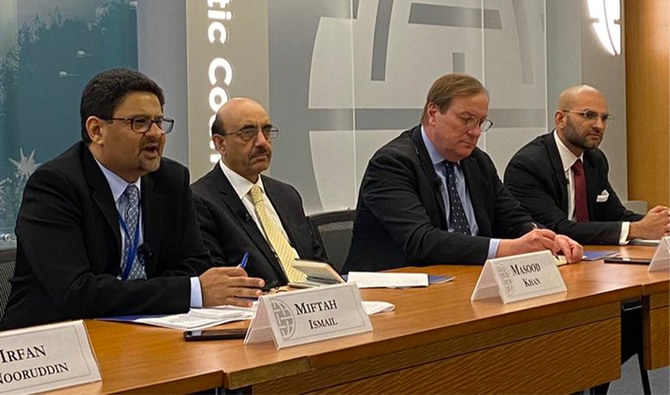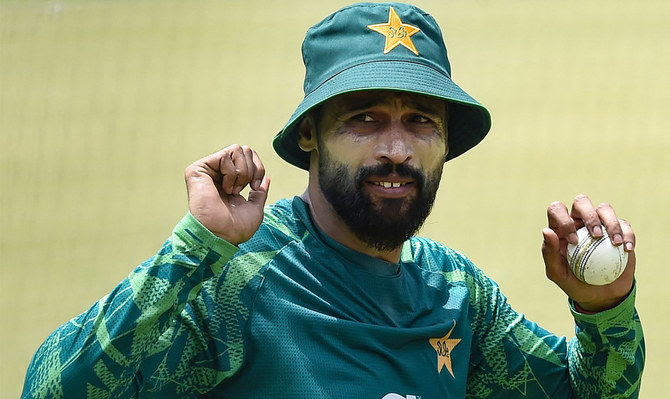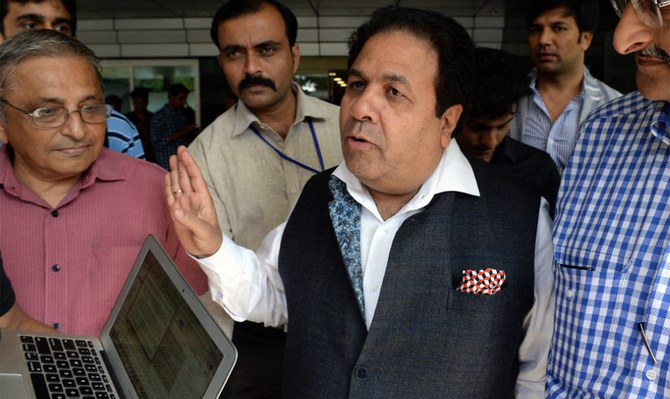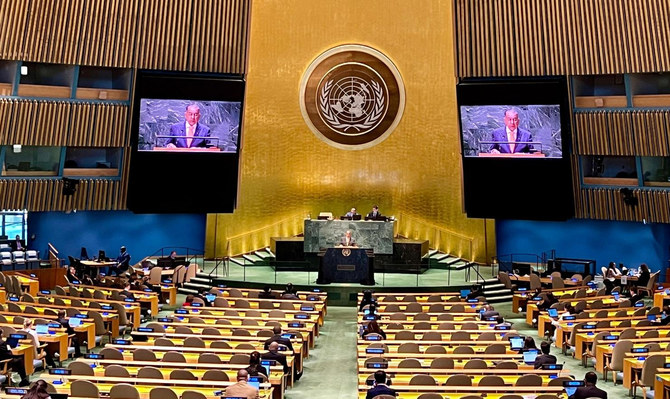KARACHI: Pakistan’s finance minister, Miftah Ismail, on Friday signaled a hike in the prices of petroleum products in Pakistan in line with the international prices, following his talks with the International Monetary Fund (IMF).
The finance minister said this while highlighting the economic agenda and priorities of the new government at an event hosted by Washington-based Atlantic Council think-tank. Ismail is in Washington to attend 2022 spring meetings of the IMF and the World Bank Group (WBG), and to meet with IMF officials for the revival of stalled $6 billion loan program.
Pakistan and the IMF have resumed talks for the completion of the seventh review under the IMF’s Extended Fund Facility, which has disbursed $3 billion out of the stipulated $6 billion to the South Asian country.
The discussions were stalled after the IMF expressed concerns over the former government’s around $1.7 billion relief package, including freezing of petroleum prices and cut in electricity tariff in response to rising inflation.
“We actually had good discussions with the fund and they have talked about removing the subsidy on fuel. I agree with them. Yes, there should be some targeted subsidy for the very poor because life has become very difficult because of the Ukraine war,” Ismail said.
“We are an elite-benefiting country that almost every subsidy you speak of goes to richest people. We can’t afford to give the subsidies that we’re giving. So we need to curtail these.”
The finance minister informed participants that Pakistan was unable to achieve the desired results, including the increase in foreign exchange reserves, despite the IMF program.
“In IMF program normally after belt tightening in first year some consolidation takes place in second year and third year of the program normally sees exchange reserve going up and some consolidation taking place,” he said.
“This is completely inverted in Pakistan. We lost lot of forex reserves and the IMF program is delayed quite a bit. One of the reasons I am here is to try and set the program back on the track.”
Ismail said his government’s aim was to bring about economic and fiscal stability, which could lead to recovery and growth. The government would ensure that this growth is all inclusive by taking care of the poor segments of the society, he added.
The finance minister informed about the ballooning accumulated losses in the country’s energy sector and termed it a “management failure.”
“Accumulated loss in power sector is about Rs2400 billion and another Rs1500 billion. I am told about gas sector that is not good way to run the country,” Ismail said.
“These are basic management things we have failed to do that is why we keep going to the fund again and again and until we get our focus right we will not be able to fix those things. We are now absolutely sure that we have to do it.”
To a question about his key areas of focus during his stay in office, the minister described the revival of the IMF program as his “top priority.”
“One success for me would be to get the IMF program back on track,” Ismail said. “We want to leave with 50 percent more (currency) reserves than what we have inherited and most importantly, the measure on control of current account deficit. We still would have the deficit may be at 2-3 percent, which is sustainable ... but 6 percent is beyond to afford.”
The minister reiterated his government’s commitment to attract US investment to all sectors of Pakistan’s economy by creating a business-friendly environment. The government recognized the potential of fintech and digital economy, and the sector would be facilitated further, he said.
Ismail said they would take step-wise measures to ensure a robust increase in Pakistan’s exports to resolve the balance of payment and current account deficit issues.
Frederick Kempe, president of the Atlantic Council, in his introductory remarks said Pakistan and the US had a longstanding partnership based on shared values of democratic governance, regional security and economic growth.
The Atlantic Council was particularly working to promote economic cooperation between the two countries, Kempe added.
Pakistan’s finance minister signals cuts in fuel subsidies amid talks with IMF
https://arab.news/wxun7
Pakistan’s finance minister signals cuts in fuel subsidies amid talks with IMF

- Miftah Ismail says there should be some targeted subsidy for poor as things have become very difficult
- The minister says Pakistan is ‘elite-benefiting country’ because almost every subsidy goes to the rich
Pakistan mulls pension reforms as government moves to curtail expenditure ahead of IMF talks

- Muhammad Aurangzeb says IMF delegation to visit Pakistan this month to discuss size, duration of next loan program
- In March this year, media widely reported the finance ministry had shared a pension reform program with the IMF
ISLAMABAD: The Pakistan government said on Tuesday it was vital to reform the country’s pension system, including by raising the retirement age, to mitigate expenditure as Islamabad aims to save the system billions of dollars per year, with a committee formed to propose recommendations.
The belt tightening moves come as Islamabad — which is facing a balance of payment crisis — is in talks with the International Monetary Fund (IMF) to secure a new long-term bailout deal. In the past, Pakistan has faced the challenges of revenue generation and government expenditure and struggled with high levels of debt, a large fiscal deficit and an ongoing need for structural reforms to improve its fiscal sustainability.
Under the last $3 billion bailout, Pakistan implemented several IMF-mandated reforms, such as budget adjustments, increasing interest rates, and higher energy prices. Among expected reforms under a new program are strengthening public finances through gradual fiscal consolidation, broadening the existing tax base and improving tax administration, and debt sustainability, all while protecting the vulnerable.
An IMF mission is expected in Pakistan in the next ten days to discuss a new loan program that the finance minister has said would be “larger and longer.”
“Age is just a number,” Finance Minister Muhammad Aurangzeb said at a press conference in Islamabad, calling for reforms in the pension system and saying pension payments were a “huge liability.”
“Sixty is the new 40. In the [private sector] institution I left before coming here [as finance minister], we raised the retirement age from 60 to 65. These are your most productive years when you have maximum experience.”
He recognized that changes to the service structure could not be carried out overnight but said Pakistan would need to move in this direction to control the pension costs.
Law Minister Azam Nazir Tarar said pension reforms would be held across the board, for which legislation was required.
“A large chunk of yearly revenue is utilized on paying retirement benefits and pensions,” Tarar said at the press conference with Aurangzeb. “Legislation is required for this as civil servants, armed forces, judicial organs, and executive organs are included.”
The law minister said a committee had been formed under the chair of the finance minister to propose recommendations pertaining to pension reforms.
In March this year, Pakistan’s media widely reported that the finance ministry had shared a pension reform program with the IMF to contain growing pension liabilities, with the consolidated federal and provincial pension expenditure projected to increase by over 20 percent from Rs1.252 trillion last year to Rs1.513tn this year.
The reforms scheme shared with the lender reportedly seeks to cut the annual federal pension expense on existing employees by changing the formula for pension calculation, slashing the commutation rate, discouraging early retirement through the imposition of a penalty, restricting the list of beneficiaries of the deceased employees, and ending the current practice of multiple pensions.
In a 2021 report, the State Bank of Pakistan said the federal pension expenditure was increasingly becoming unsustainable:
“When we look at the federal pension bill, there has been a significant rise. Pension bill has increased at a Compounded Annual Growth Rate (CAGR) of almost 14pc during 2012-23.”
According to the bank, overall pension spending as a percentage of total budgeted expenditure for FY20 exceeded the federal and provincial health and education spending and was almost half the level of consolidated development expenditures.
The World Bank in 2020 warned that salary and pension costs in Pakistan would persistently grow and crowd out other public expenditures in the coming years.
Rejuvenated Amir back for ‘unfinished work’ at T20 World Cup

- Amir was selected at the age of 15 by none other than great left-armer Wasim Akram at a fast-bowling camp
- He says his short-term goal is to win World Cup, adds it’s hard to describe the feeling of playing for Pakistan
KARACHI: Rejuvenated fast bowler Mohammad Amir said he has “unfinished work” at next month’s T20 World Cup, 15 years after dazzling as a teenager when Pakistan last lifted the trophy.
The 32-year-old, who was jailed for spot-fixing in 2011, came out of retirement last month and is grateful to have another crack at the World Cup.
“It’s a great feeling to be playing for Pakistan again,” Amir told AFP by phone from Lahore this week ahead of the tournament in the United States and the West Indies beginning on June 2.
“I want to complete the unfinished work and, for me, the short-term goal is to win the World Cup.”
The young Amir impressed in all formats after breaking into the Pakistan side in 2009 and playing at the T20 World Cup.
Within a year he was one of the hottest young talents in cricket, but his precocious career then crashed to an infamous halt in 2010.
Amir was one of three Pakistan players banned from cricket for five years for spot-fixing during a Test match in England after being caught in a newspaper sting. He was later jailed in the UK for six months.
Pakistan captain Salman Butt, who was deemed the ringleader, and fellow quick bowler Mohammad Asif were also banned and the pair were jailed for 30 and 12 months respectively.
Amir returned after his ban to play for Pakistan in 2016 but announced a shock retirement in December 2020 after poor form kept him from being selected.
He will form a potent pace bowling attack with spearhead Shaheen Shah Afridi, Naseem Shah and Haris Rauf that sees Pakistan ranked among the World Cup favorites.
“The Pakistan Cricket Board and the team management have shown trust in me so I have to fulfil that trust,” said Amir.
“I have come back after four years and when you play for your country the feeling cannot be described.”
Amir played three of the four T20 home matches against New Zealand last month, taking three wickets in a 2-2 drawn series, and said he felt part of the attack again.
“To be honest I felt fitter than in 2019 and until you are fit you cannot express yourself, so I am ready to do better and better,” said Amir.
He will be in action when Pakistan travel to Ireland for three T20s in Dublin on May 10, 12 and 14.
Pakistan then move to England to play the defending T20 world champions in Leeds (May 22), Birmingham (May 25), Cardiff (May 28) and London (May 30).
Brought up in Changa Bangial village in Punjab province, some 60 kilometers from the capital Islamabad, Amir was determined to make his name in cricket after his five older brothers introduced him to playing.
He was picked out at the age of 15 by none other than great left-armer Wasim Akram at a fast-bowling camp and within two years grew in height and overcame a stress fracture of the back.
Amir said now he only wanted to remember the good events in his career.
“The 2009 Twenty20 World Cup winning memories are special and excite me to this day,” said Amir, who took six wickets in seven matches in the tournament.
They included the prize dismissal of Sri Lanka opener Tillakaratne Dilshan — the player of the tournament — in Pakistan’s eight-wicket final victory.
“I was selected for the first time and then became part of a champion team.
“When I landed (back) at Rawalpindi airport to go to my village there were so many cars and they were showering flowers on me,” he recalled.
“I am lucky that I am still playing. When I came, I was the youngest in the team, so here I am having another chance to win the World Cup and that is the target for me and my team.”
Indian cricket official says will send team to Pakistan only with government’s permission

- Pakistan are expected to host Champions Trophy tournament from February to March 2025
- No Indian team has traveled to Pakistan for cricket since 2008 due to deteriorating political relations
ISLAMABAD: A senior official of the Indian cricket board this week confirmed that it would send its team next year to Pakistan for the Champions Trophy tournament only if its central government gave it permission to do so.
Pakistan is expected to host the ICC Champions Trophy 2025 tournament from February to March 2025. The Pakistan Cricket Board (PCB) has proposed three venues for the tournament— Lahore, Karachi and Rawalpindi, according to local and international media reports. However, out of the eight participating teams, a question mark looms over whether the Indian cricket team will travel to Pakistan for the tournament.
The last time an Indian cricket team traveled to Pakistan for a cricket event was in 2008 for the Asia Cup. The Nov. 26 2008 Mumbai attacks caused a severe strain in India-Pakistan relations, forcing both teams to play against each other only during international events and at “neutral venues.”
As hosts of the Asia Cup last year, Pakistan were forced to agree to a hybrid model according to which India played all of their matches, including those against Pakistan, in Sri Lanka. Though Pakistan raised the prospect of a hybrid model for their presence in the ODI World Cup in India last year, they ended up playing all their games in the neighboring country.
“In the case of the Champions Trophy, we will do whatever the government of India will tell us to do,” Rajeev Shukla, vice president of the Board of Control for Cricket in India (BCCI) told Indian news agency ANI on Monday.
“We send our team only when the government of India gives us permission.”
According to cricket website ESPNcricinfo, Pakistan has proposed hosting all of India’s Champions Trophy matches in the eastern city of Lahore. The website reported that hosting all of India’s matches in Lahore would mean less logistical and security headaches around their travel. Additionally, the Wagah border crossing in Lahore allows Indian fans a relatively easier option to visit.
Pakistan are defending champions of the ICC Champions Trophy. The green shirts won the trophy under former captain Sarfaraz Ahmed in 2017 at The Oval in London after thrashing India by 180 runs to win the tournament. Champions Trophy 2017 was thought to be the last edition of the tournament until the ICC brought it back in the new rights cycle (2023-2027) and awarded Pakistan the hosting rights for the 2025 edition.
At UN General Assembly, Pakistan proposes collective efforts to thwart space weaponization

- Pakistan’s UN ambassador says threats in and from outer space have “escalated sharply” in recent years
- Expresses concern over deployment of missile defense systems, their integration with space technologies
ISLAMABAD: Pakistan’s ambassador to the United Nations this week proposed collective action against the weaponization of outer space, citing proliferation of destructive weapons in the territory by major powers during a debate at the UN General Assembly.
Munir Akram, Pakistan’s permanent representative to the UN, was speaking at a debate at the General Assembly on Monday over Russia’s decision last month to veto a draft US-Japan resolution that called on countries to prevent an arms race in outer space. The Security Council rejected the resolution by a vote of 13 in favor to one against, with China abstaining from the vote.
The vote came after Washington accused Moscow of developing an anti-satellite nuclear weapon to put in space. Russia has denied the allegations, with its President Vladimir Putin saying Moscow was against putting nuclear weapons in space.
During his speech at the UN General Assembly, Akram said threats to security in and from outer space have “escalated sharply” in recent years, adding that it was evident from the placement of weapons in space.
“Ambassador Munir Akram called for the issue of weaponization of outer space to be transmitted to the Conference on Disarmament for further consideration and urged collective action to preserve outer space for peaceful purposes,” a press release from Pakistan’s permanent mission to the UN said on Tuesday.
Akram said Pakistan has always maintained a principled position that resolutions on global disarmament should be deliberated and concluded in a transparent manner. He called for doing so at appropriate forums such as the Conference on Disarmament, the UN Disarmament Commission, and the first Committee of the General Assembly.
“In his statement, Ambassador Akram underscored the gravity of the situation, citing the proliferation of weapons in space and the increasing militarization of outer space by major powers,” the statement said. “He expressed concern over the deployment of missile defense systems and their integration with outer space technologies, warning of the destabilizing impact on global and regional security.”
He said if nuclear weapons were deployed in outer space, it would constitute a violation of the Outer Space Treaty. Akram highlighted the need for multilateral cooperation, particularly within the Conference of Disarmament, to address growing threats posed by outer space’s weaponization.
Pakistan is eager to take strides in its own space program. China last Friday launched a Pakistani satellite, ‘ICUBE-Qamar’ or ICUBE-Q into outer space, which is set to enter the lunar orbit on a high-stakes moon mission to reach the lunar side. The launch was part of China’s Chang’e-6 mission, a planned robotic lunar exploration mission, that aims to obtain the first-ever soil and rock samples from the lunar far side and return them to Earth.
The satellite was designed and developed by IST (Pakistan’s Institute of Space Technology) with China’s Shanghai University and Pakistan’s national space agency SUPARCO, state media had reported.
A senior ICT official who was co-lead on the project said last week that this is Pakistan’s first deep space mission, describing it as a “historic moment.”
Pakistan eye third victory in Azlan Shah hockey tournament against Japan today

- Pakistan beat hosts Malaysia and South Korea 5-4, 4-0 respectively last week
- 30th edition of Sultan Azlan Shah Cup is being played in Malaysia from May 4-11
ISLAMABAD: The Pakistan men’s field hockey team will face Japan today, Tuesday, in the Sultan Azlan Shah Cup clash in Ipoh, state-run media reported, as the green shirts eye a third victory in the tournament.
Pakistan have already won the two matches they have played in the tournament so far against hosts Malaysia, and South Korea. Pakistan beat a strong Malaysian side 5-4 on Saturday to win their opening contest of the cup before thrashing South Korea 4-0 on Sunday.
“In the 30th Sultan Azlan Shah Hockey Cup, Pakistan in their third match will play against Japan at Ipoh in Malaysia today,” state-run Radio Pakistan reported, adding that the match is scheduled to begin at 3:30 p.m.
Pakistani players Abdul Hanan Shahid, Arshad Liaqat, Ghazanfar Ali and Sufiyan Khan scored goals against South Korea to ensure the national team dominated the match on Sunday. Pakistan’s defense did an impressive job to contain the Korean hockey team, thwarting their efforts to score a single goal.
The 30th edition of the prestigious field hockey tournament is being played in Ipoh, Malaysia from 4-11 May. The cup will be contested between six teams, namely Canada, Japan, Malaysia, New Zealand, Pakistan and Korea.
The Sultan Azlan Shah Cup 2024 will see a round-robin stage at first where all six participating teams will play against each other once, followed by positional playoffs.
The teams finishing in the bottom two places of the league stage will contest in a fifth-place classification match. Teams finishing in third and fourth place in the pool stage will compete for bronze, while the top two teams will play in the final for the title.
All participating teams, except Japan, will be heading to Gniezno in Poland shortly after the tournament to participate in the FIH Hockey Men’s Nations Cup. There the title and an opportunity to be promoted to the FIH Hockey Pro League will be at stake.










